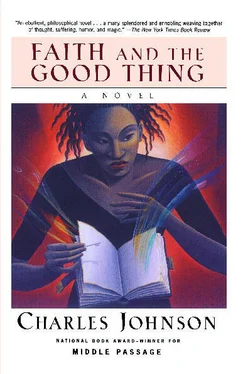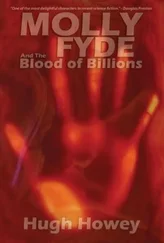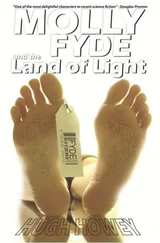As always, he put her at ease, but only slightly. She could watch him painting, her jealousy fading before the enchantment of the creative process — the painstaking application of paint, the corrections that brought to life something somehow beautiful and more real than all the things out there. He couldn’t be blamed for his reaction. After three years of living away from the sunlight in a tiny cell he had a right to his freedom. Just the same, it disturbed her. From the moment she knew she was pregnant she realized that a portion of her bondage had come to an end. The thing moved inside her in some warm, deep place like sea depths where insects are spawned, or some immense vale so fertile your spit could make a thousand salvias burst like fireworks from their seeds. She could not hate him. Through him she was no longer apart from the mysteries of the earth, but involved in them. He had given her Big Todd’s truth: only through the stranger, or one stranger than yourself, could you seize your own life’s meaning. But he, like all men, was a stranger to her, to the earth, and was driven by a restlessness, a disease she only now understood. It had stricken Lynch and Brown and Barrett alike, had laid its heavy hand on Big Todd — suffocating them with a sense of fragility and foolishness before the rhythm of the world. She knew that was it — life was music and they could not dance, had no steps, so to speak, and stood there on the gigantic dance floor of existence, sulking and sneering at those who did dance. They could not be content as the humble caretakers of the garden of creation, could not create as she, or God, or a risible old witch woman could; they could not conjure beauty from the nothingness of all our lives. They were the dead living. Yet she had that connection with things, that capacity to dance if the universe said so, to sing if it demanded song. Unable to create, to conjure life from darkness, men railed against the world. Brown worshiped it to gain its favor, Lynch dissected it, Alpha painted it, Tippis — unable to change it — changed himself, Maxwell ignored it. Creation — conjuring, dancing to the world’s grim mi, fa, mi, for all men was a queer thing — it couldn’t be controlled, couldn’t be bought, or captured on canvas, or bent to fit a desperate dream; above all, it couldn’t be ignored. Then how did a woman — be she whore or housewife, shrew or saint, witch or virgin — seize that mystery? Deep within, Faith knew she harbored that secret. In a man’s world she was denied so much. Conquest was forbidden; passion was forbidden; freedom was impossible: what remained? the biological superiority? creation? and how then creation? The child, in an odd way, was the answer — it was all history focused on a single point — a trillion amoebae, plants, and animals martyred by evolution to produce just this one child and no other, holding in microcosm all epochs, or so she believed; it pointed to every beast and tree and transformation of life, of that peculiar dance that had to be before it could be assembled. By her. She did this, created this new subject of the world. If it was a girl, she would know all this before her first words; if a boy — woe.
In her apartment she thought of this, prescinding the strange changes stretching and swelling her flesh and mind for reflection. Maxwell probably suspected. In the mornings he would watch silently from the bathroom doorway as she vomited into the toilet. Yet he said nothing. Five weeks ago she’d brought home four new dresses, all larger than the ones in her closet. He remarked about their size, but took his questioning no further. But if he suspected, why was he silent? Had her confession reamed out his feelings long ago? What she’d done to him, or failed to feel, came dangerously close to bordering on sin. Tippis hadn’t mentioned the terrible rewards of taking another as one’s object — the growing dependence, the loss of one’s self-esteem. They had to be acknowledged; she lived with them every day; she saw the emptiness in Maxwell’s eyes, saw the way his interest shifted from her and his home to the office, to overtime and drinking with his bosses, not because he coveted a raise or a successful column but because he could not bear to be home with her for long. And now? Would her bearing the baby break him completely? Perhaps it would be better to lie after all. But she had done enough, or not done enough, to Maxwell already. He was only a man.
Seven-thirty.
Faith began to worry. He should have arrived hours ago. It was possible that Jones, as disturbed as he was, had burst into The Sentry offices downtown and made a scene, had exposed Maxwell’s marital problems for all to hear and so infuriated Maxwell that they’d fought. Faith chain-smoked. If they’d fought, inside the building or outside in some garbage-strewn alley, or on the street before dozens of onlookers afraid to get involved — and it was likely since Maxwell stayed at sixes and sevens with everyone — then Jones would be arrested. He’d be sent back to prison. She’d be alone again.
Faith forced her worries from her mind and walked to her bedroom window. She looked to the dark lake below, to the waves plashing against stark white rocks along the brown rolling beach. Two lovers strolled on the sand below, their fingers interlaced as they walked barefoot to sit on a large blanched rock. Things could work out all right if Maxwell released her. It would be better for him. She remembered the last time — months ago — when he’d knocked on her bedroom door at midnight, his shorts straining with an erection as hard as Space-Age plastic. She’d risen, leaning on her elbows, pitying him, beckoning him into the bedroom with the hope that— maybe —things would work out. He’d kissed her full in the mouth, slid into bed with his respirator, and tried to rouse her feelings. But as he touched her arm he seemed to remember painful things — their arguments, her confessions, and his tool shrank completely from the occasion. She could smell his sweat as he lay beside her, whining. “You don’t need me, I guess. You need somebody who can do you some good. I—” She’d pressed her lips to his, tasting the bitter fumes of his asthma spray, and he said, “Damn you,” whom he meant, he didn’t say; but he could hardly have meant his respirator. He cuddled up in her arms like a child, fell fast asleep, and not once during the night realized she had cried. He never approached her again. Not once. Faith lit another cigarette, certain that a break would be best for them. He could remarry someone more like himself, and she and Jones could return to Hatten County. They could rebuild her father’s farmhouse, throw up a byre, work the fields, raise the baby. Big Todd’s delicate dream of a bucolic life lived like a myth would not be lost, only deferred, not destroyed, but finally realized in her and the boy who had his favor. She swore to that, and decided to name the baby after Todd.
Before she could turn the sound of Todd Jones over on her tongue, she heard a key in the door. It grated against the metal lock for a long time, like a cat or a demon trying to break in. It startled her; she imagined some long-dead thing covered with seaweed and brine, rising with blood-red foam from the floor of the lake, dragging its scaly form along the sand to the entrance of the building below, then slowly scaling the steps, oozing through the quiet hallway with a leer on its hideous three heads to claw at her door, burst in, and pluck her heart from her breast. The noise stopped. She heard a pounding on the door and wall outside.
“Open the god damn door for Christ’s sake!”
By the time Faith reached the door she was out of breath; already the baby was stealing her wind. She threw open the latch, and Maxwell fell in, his head pitching forward. She caught him, coughed at the sickly sweet smell of whisky on his breath, and helped him to the davenport in the front room. Maxwell’s head rolled back and forth on the back of the davenport — his mouth hung open, and his eyes were woven with red and blue veins of blood. His limbs seemed boneless. He leaned forward and tried to focus on her as she bit her nails. A chill ran up her spine as she imagined the course of his thoughts across the background of cocoa-colored walls, rug, and delphiniumblue draperies to the foreground where she stood, resting her hand on a straight-back chair, no more important to him than the cold furniture itself. They were obstacles to the tired tread of his feet across the room, even as she obstructed his progress through. She held her breath. Waiting.
Читать дальше












